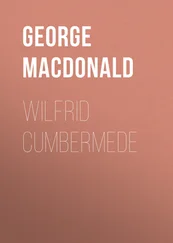George MacDonald - Warlock o' Glenwarlock - A Homely Romance
Здесь есть возможность читать онлайн «George MacDonald - Warlock o' Glenwarlock - A Homely Romance» — ознакомительный отрывок электронной книги совершенно бесплатно, а после прочтения отрывка купить полную версию. В некоторых случаях можно слушать аудио, скачать через торрент в формате fb2 и присутствует краткое содержание. Издательство: Иностранный паблик, Жанр: foreign_prose, foreign_religion, foreign_antique, на английском языке. Описание произведения, (предисловие) а так же отзывы посетителей доступны на портале библиотеки ЛибКат.
- Название:Warlock o' Glenwarlock: A Homely Romance
- Автор:
- Издательство:Иностранный паблик
- Жанр:
- Год:неизвестен
- ISBN:нет данных
- Рейтинг книги:3 / 5. Голосов: 1
-
Избранное:Добавить в избранное
- Отзывы:
-
Ваша оценка:
- 60
- 1
- 2
- 3
- 4
- 5
Warlock o' Glenwarlock: A Homely Romance: краткое содержание, описание и аннотация
Предлагаем к чтению аннотацию, описание, краткое содержание или предисловие (зависит от того, что написал сам автор книги «Warlock o' Glenwarlock: A Homely Romance»). Если вы не нашли необходимую информацию о книге — напишите в комментариях, мы постараемся отыскать её.
Warlock o' Glenwarlock: A Homely Romance — читать онлайн ознакомительный отрывок
Ниже представлен текст книги, разбитый по страницам. Система сохранения места последней прочитанной страницы, позволяет с удобством читать онлайн бесплатно книгу «Warlock o' Glenwarlock: A Homely Romance», без необходимости каждый раз заново искать на чём Вы остановились. Поставьте закладку, и сможете в любой момент перейти на страницу, на которой закончили чтение.
Интервал:
Закладка:
In after years when he remembered the enchanting dreams of his boyhood, instead of sighing after them as something gone for ever, he would say to himself, "what matter they are gone? In the heavenly kingdom my own mother is waiting me, fairer and stronger and real. I imagined the elves; God imagined my mother."
The unconscious magician of the whole mystery, who had seemed to the boy to be spinning his very brain into dreams, rose, and, drawing near the bed, as if to finish the ruthless destruction, and with her long witch-broom sweep down the very cobwebs of his airy phantasy, said,
"Is ye waukin', Cosmo my bairn?"
"Ay am I," answered Cosmo, with a faint pang, and a strange sense of loss: when should he dream its like again!
"Soon, soon, Cosmo," he might have heard, could he have interpreted the telephonic signals from the depths of his own being; "wherever the creative pneuma can enter, there it enters, and no door stands so wide to it as that of the obedient heart."
"Weel, ye maun hae yer supper, an' syne ye maun say yer prayers, an' hae dune wi' Tyseday, an' gang on til' Wudens-day."
"I'm nae wantin' ony supper, thank ye," said the boy.
"Ye maun hae something, my bonny man; for them 'at aits ower little, as weel's them 'at aits ower muckle, the night-mear rides—an' she's a fearsome horse. Ye can never win upo' the back o' her, for as guid a rider as ye're weel kent to be, my bairn. Sae wull ye hae a drappy parritch an' ream? or wad ye prefar a sup of fine gruel, sic as yer mother used to like weel frae my han', whan it sae happent I was i' the hoose?" The offer seemed to the boy to bring him a little nearer the mother whose memory he worshipped, and on the point of saying, for the sake of saving her trouble, that he would have the porridge, he chose the gruel.
He watched from his nest the whole process of its making. It took a time of its own, for one of the secrets of good gruel is a long acquaintance with the fire.—Many a time the picture of that room returned to him in far different circumstances, like a dream of quiet and self-sustained delight—though his one companion was an aged woman.
When he had taken it, he fell asleep once more, and when he woke again, it was in the middle of the night. The lamp was nearly burned out: it had a long, red, disreputable nose, that spoke of midnight hours and exhausted oil. The old lady was dozing in her chair. The clock had just struck something, for the sound of its bell was yet faintly pulsing in the air. He sat up, and looked out into the room. Something seemed upon him—he could not tell what. He felt as if something had been going on besides the striking of the clock, and were not yet over—as if something was even now being done in the room. But there the old woman slept, motionless, and apparently in perfect calm! It could not, however, have been perfect as it seemed, for presently she began to talk. At first came only broken sentences, occasionally with a long pause; and just as he had concluded she would say nothing more, she would begin again. There was something awful to the fancy of the youth in the issuing of words from the lips of one apparently unconscious of surrounding things; her voice was like the voice of one speaking from another world. Cosmo was a brave boy where duty was concerned, but conscience and imagination were each able to make him tremble. To tremble, and to turn the back, are, however, very different things: of the latter, the thing deserving to be called cowardice, Cosmo knew nothing; his hair began to rise upon his head, but that head he never hid beneath the bed-clothes. He sat and stared into the gloom, where the old woman lay in her huge chair, muttering at irregular intervals.
Presently she began to talk a little more continuously. And now also Cosmo's heart had got a little quieter, and no longer making such a noise in his ears, allowed him to hear better. After a few words seemingly unconnected, though probably with a perfect dependence of their own, she began to murmur something that sounded like verses. Cosmo soon perceived that she was saying the same thing over and over, and at length he had not only made out every word of the few lines, but was able to remember them. This was what he afterwards recalled—by that time uncertain whether the whole thing had not been a dream:
Catch yer naig an' pu' his tail: In his hin' heel ca' a nail; Rug his lugs frae ane anither—Stan' up, an' ca' the king yer brither.
When first he repeated them entire to himself, the old woman still muttering them, he could not help laughing, and the noise, though repressed, yet roused her. She woke, not, like most young people, with slow gradation of consciousness, but all at once was wide awake. She sat up in her chair.
"Was I snorin', laddie,'at ye leuch?" she asked, in a tone of slight offence.
"Eh, na!" replied Cosmo. "It was only 'at ye was sayin' something rale funny—i' yer sleep, ye ken—a queer jingle o' poetry it was."
Therewith he repeated the rime, and Grannie burst into a merry laugh—which however sobered rather suddenly.
"I dinna won'er I was sayin' ower thae fule words," she said, "for 'deed I was dreamin' o' the only ane I ever h'ard say them, an' that was whan I was a lass—maybe aboot thirty. Onybody nicht hae h'ard him sayin' them—ower and ower til himsel', as gien he cudna weary o' them, but naebody but mysel' seemed to hae ta'en ony notice o' the same. I used whiles to won'er whether he fully un'erstude what he was sayin'—but troth! hoo cud there be ony sense in sic havers?"
"Was there ony mair o' the ballant?" asked Cosmo.
"Gien there was mair; I h'ard na't," replied Grannie. "An' weel I wat! he was na ane to sing, the auld captain.—Did ye never hear tell o' 'im, laddie?"
"Gien ye mean the auld brither o' the laird o' that time, him 'at cam hame frae his sea-farin' to the East Indies—"
"Ay, ay; that's him! Ye hae h'ard tell o' 'im! He hed a ship o' 's ain, an' made mony a voyage afore ony o' 's was born, an' was an auld man whan at len'th hame cam he, as the sang says—ower auld to haud by the sea ony more. I'll never forget the luik o' the man whan first I saw him, nor the hurry an' the scurry, the rinnin' here, an' the routin' there,'at there was whan the face o' 'm came in at the gett! Ye see they a' thoucht he was hame wi' a walth ayont figures—stowed awa' somewhaur—naebody kent whaur. Eh, but he was no a bonny man, an' fowk said he dee'd na a fairstrae deith: hoo that may be, I dinna weel ken: there WAR unco things aboot the affair—things 'at winna weel bide speykin' o'. Ae thing's certain, an' that is,'at the place has never thriven sin syne. But, for that maitter, it hedna thriven for mony a lang afore. An' there was a fowth o' awfu' stories reengin' the country, like ghaists 'at naebody cud get a grip o'—as to hoo he had gotten the said siller, an' sic like—the siller 'at naebody ever saw; for upo' that siller, as I tell ye, naebody ever cuist an e'e. Some said he had been a pirate upo' the hie seas, an' had ta'en the siller in lumps o' gowd frae puir ships 'at hadna men eneuch to haud the grip o' 't; some said he had been a privateer; an' ither some said there was sma' differ atween the twa. An' some wad hae't he was ane o' them 'at tuik an' sauld the puir black fowk,'at cudna help bein' black, for as ootlandish as it maun luik—I never saw nane o' the nation mysel'—ony mair nor a corbie can help his feathers no bein' like a doo's; an' gien they turnt black for ony deevilry o' them 'at was their forbeirs, I kenna an' it maks naething to me or mine, —I wad fain an' far raither du them a guid turn nor tak an' sell them; for gien their parents had sinned, the mair war they to be pitied. But as I was sayin', naebody kent hoo he had gethert his siller, the mair by token 'at maybe there was nane, for naebody, as I was tellin' ye, ever had the sma'est glimp o' siller aboot 'im. For a close-loofed near kin o' man he was, gien ever ony! Aye ready was he to borrow a shillin' frae ony fule 'at wad len' him ane, an' lang had him 'at len't it forgotten to luik for 't, er' he thoucht o' peyin' the same. It was mair nor ae year or twa 'at he leeved aboot the place, an' naebody cared muckle for his company, though a' body was ower feart to lat him ken he was na welcome here or there; for wha cud tell he micht oot wi' the swoord he aye carriet, an' mak an' en' o' 'im! For 'deed he fearna God nor man, ony mair nor the jeedge i' the Scriptur'. He drank a heap—as for a' body at he ca'd upo' aye hed oot the whisky-bottle well willun' to please the man they war feart at."
Читать дальшеИнтервал:
Закладка:
Похожие книги на «Warlock o' Glenwarlock: A Homely Romance»
Представляем Вашему вниманию похожие книги на «Warlock o' Glenwarlock: A Homely Romance» списком для выбора. Мы отобрали схожую по названию и смыслу литературу в надежде предоставить читателям больше вариантов отыскать новые, интересные, ещё непрочитанные произведения.
Обсуждение, отзывы о книге «Warlock o' Glenwarlock: A Homely Romance» и просто собственные мнения читателей. Оставьте ваши комментарии, напишите, что Вы думаете о произведении, его смысле или главных героях. Укажите что конкретно понравилось, а что нет, и почему Вы так считаете.












